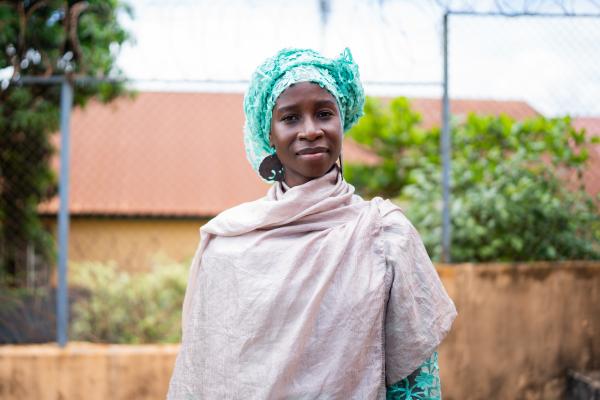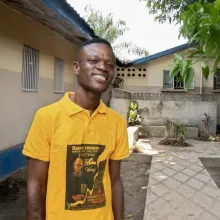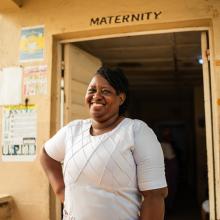After completing her internship after medical school and starting a family, Dr. Jalloh made a decision that would redefine her path. She requested to be posted in psychiatry, hoping to better balance work and home life. What began as a practical choice quickly transformed into a deeply fulfilling calling that placed her in the first-ever psychiatry residency program in the country. After three years of training in Sierra Leone she graduated as the first West African-accredited psychiatrist in the nation, a milestone not only for her career but also for the future of mental health care.
Based at the Sierra Leone Psychiatric Teaching Hospital (SLPTH), Dr. Jalloh admits she was initially nervous. Psychiatry remains heavily stigmatized in Sierra Leone. However, with the support of her supervisors and the critical partnership of Partners In Health Sierra Leone (PIH-SL), the journey became rewarding.
Today, she stands as Sierra Leone’s first West African trained psychiatrist. But for her, titles are secondary. “Psychiatry is about restoring function and helping people return to their lives. It brings a kind of joy and peace that’s hard to describe,” she explains.
In this interview, Dr. Jalloh reflects on this stepping stone, the realities of working in mental health care at SLPTH, and her vision for psychiatry in Sierra Leone.
How have you seen the field of psychiatry evolve in Sierra Leone during your career?
Things have changed a lot. When I first started working here, the patient load was small. It was mostly follow-up cases with just a few new ones. But now, it’s busy. Some days at the outpatient clinic, we see as many as 15 new patients. Thanks to ongoing sensitization efforts through radio programs, door-to-door outreach, and community awareness campaigns, more people are coming forward. Unlike in the past, when the first point of contact was often a traditional healer, many patients now come straight to us.
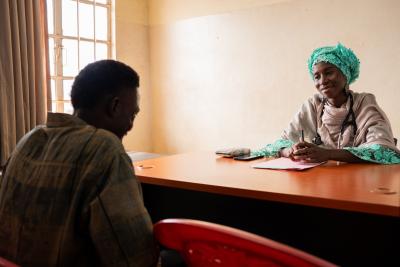
Dr. Haja Jalloh provides counseling to a patient at the Sierra Leone Psychiatric Teaching Hospital.
Lahai Khumala / PIH
What were some key moments or milestones that stood out to you in the development of SLPTH?
Back when I was in medical school, no one wanted to come to SLPTH. The facility had a bad reputation and people were afraid to enter. But when I returned as a medical officer, the transformation was incredible. Thanks to the leadership of our chiefs and support from PIH-SL, everything changed.
We’ve had so many success stories. One of the most impactful changes has been the establishment of the child and adolescent mental health unit. It has helped shape the hospital into what it is today. In the past, we focused only on adults, but now, we are giving children the care they have long needed.
As someone who loves working with children, this part of the job means a lot to me. Many of the kids we see had dropped out of school or were neglected, but now, they’re back in classes and thriving. The symptoms of children who were once withdrawn or depressed have significantly reduced through talk therapy and consistent care.
We hear that you love spending time in the hospital’s child and adolescent unit. What does this unit represent for you and what impact have you seen since its inception?
Every child deserves to be loved and treated with dignity. This belief drives much of our work. We have been educating caregivers. Most of the time, it is grandmothers who bring the children in, occasionally mothers but rarely fathers. However, thanks to ongoing psychoeducation efforts, we’ve seen real improvement in caregiver turnout. It often starts with simply explaining the conditions, helping families understand that it is not spiritual or supernatural, but medical and manageable. Once they understand that, the fear and stigma begin to fade. Neglect is decreasing and more families are getting involved in their children’s care.
With only a few psychiatrists in the country and the high demand for mental health services, how does SLPTH manage the workload, and what do you think are some of the most pressing needs for growth in the field?
Truth be told, it hasn’t been easy. Two of my colleagues are currently in Ghana for their rotations, so we are left with only three small teams. If you find this kind of work fulfilling, it’s doable, but if not, it can be quite difficult. That said, we do have a good number of residents currently in training. In the next two years, we expect to have more psychiatrists joining the workforce. Ideally, each district should have its own psychiatrist, which would significantly reduce the burden here. Patients wouldn’t have to travel long distances to access care.
PIH-SL has been doing an awesome job providing free medication and food, which is a huge relief, especially for patients who already struggle to afford transport to get here. When medication runs out, it becomes a serious problem, because most patients can’t afford to buy it themselves. Even when we give them prescriptions, there’s no guarantee they’ll be able to fill them.
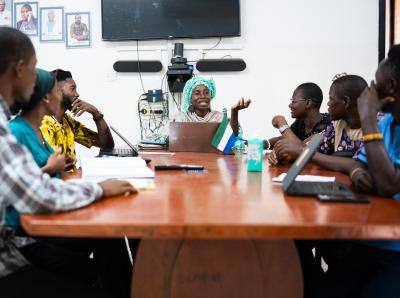
Dr. Haja Jalloh leads a staff meeting at the Sierra Leone Psychiatric Teaching Hospital.
Lahai Khumala / PIH
What were some of the biggest challenges you faced as one of the first psychiatry residents?
Personally, I had to put my life on hold for the residency. I even sent my kids away. If you know me, you would know that my children and I are incredibly close, we’re like five and six, always together. But I had to go for rotations in Ghana and then Kono, and for most of that time, I was living alone. That was one of the hardest parts.
Usually, all residents in this region travel to Ibadan, Nigeria for the psychiatry primary exams, as it used to be the only center in West Africa. Fortunately, for the first time, they created an additional exam center in Ghana. Since we had already been to Ghana for rotations, it made things a bit easier.
Ghana was more familiar and I knew at least two other people taking the exam which helped reduce the anxiety. Still, the exam was incredibly stressful. I was actually sick during the exams. My chest was burning, I was cold, and I missed the notification to start the exam because I was so disoriented.
You are the first locally trained Sierra Leonean psychiatrist. How do you think your achievement could inspire other young women in medicine and mental health?
I am the first West African trained psychiatrist in Sierra Leone. I hope that seeing me in psychiatry will inspire other women to take an interest in the field. Psychiatry in Sierra Leone is a male-dominated specialty, partly because of the belief that psychiatric facilities are unsafe. But if people see that I am here, doing the work and doing well, perhaps they will feel more confident about pursuing it themselves.
There’s a widespread stereotype that our patients are violent, but what many don’t realize is that our training equips us to de-escalate situations effectively.
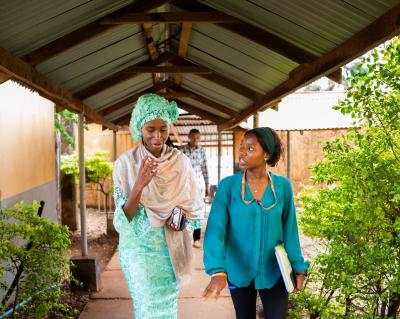
Dr. Haja Jalloh (left) speaks with Psychosocial Rehabilitation Technician Ruth A. Turay while walking through the Sierra Leone Psychiatric Teaching Hospital.
Lahai Khumala / PIH
How have you seen the perception of mental health change in Sierra Leone over the years, and what more needs to be done to reduce stigma?
Sierra Leone is changing. More people are seeking mental health care and becoming open to treatment. While some still turn to traditional healers, it’s important not to blame them. Unlearning long-held beliefs takes time, especially when those beliefs are familiar. But there’s growing acceptance now that mental illness is not about superstition, it’s a medical issue that deserves proper care.
If you could share one piece of advice with young psychiatrists or people in the mental health field in Sierra Leone, what would it be?
Everyone deserves to belong and to be treated with love. People with mental health conditions have just as much right to dignity and respect as anyone else. If we don’t discriminate against someone with hypertension or diabetes, why should we treat someone with a mental illness any differently? There’s no justification for the neglect or mistreatment that so many of them face.
I have observed that individuals without strong family support tend to relapse more frequently. When patients are treated with kindness and respect, they feel supported and take their medication. This allows them to remain stable for longer periods. Words like ‘mad’ or ‘crazy’ are harmful and perpetuate stigma. Instead, we should focus on integrating people with mental health conditions into society, letting them participate and contribute in meaningful ways. Too often, when they offer to help at home, the response is, ‘It’s okay, don’t worry,’ as if they’re incapable. But that mindset needs to change.
Finally, psychiatry is safe.
What has been the most rewarding aspect of your work at SLPTH?
One of the most rewarding parts of this work is seeing success stories. I love watching people recover and return to their lives. I call them ‘my people’ because, over time, they start to feel like family. When they are able to go back home, reunite with their families, return to work or school- it’s incredibly fulfilling.
